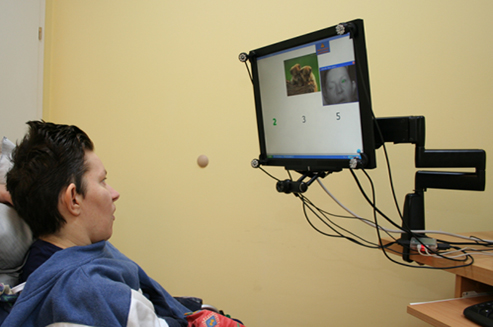Cyber Eye is a system used to research the state of consciousness among people diagnosed as vegetative state patients created by the team from the Department of Multimedia Systems at the Gdańsk University of Technology headed by Professor Andrzej Czyżewski.
Cyber Eye is a human-computer interface whose main device is a typical no-contact system for monitoring the visual fixation point. The ability to follow patients’ gaze (direction of looking) has a huge potential both in the diagnosis as well as rehabilitation of people with consciousness disorders. On the one hand, information about the fixation point can be used in patients’ communication with the world. Using their eyes patients can indicate a specific pictogram representing their current need or a specific letter on a virtual keyboard, which means the possibility of formulating whole words and sentences. The second important and somehow innovative solution connected with following the gaze of patients with consciousness disorders who have come out of coma is testing patients’ cognitive functions and consciousness level. The interpretation of reactions and potential answers is based on analysing patients’ eyes activity. Patients scan the image and indicate/select a specific graphic or text object as a reaction to their therapist’s words with their eyes. Diagnosis and rehabilitation is based on testing and stimulating cognitive functions, such as attention, perception, memory or thinking. Moreover, Cyber Eye enables direct communication with the world, for example through a virtual keyboard, which allows entering any text with one’s eyes. Basing on Cyber Eye, scientists are developing Cyber Bed, which would enable patients to become partially independent in a hospital room or at home.
At the moment Cyber Eye works in six centres in Poland, including the Budzik Clinic built by the Akogo Foundation created by Ewa Błaszczyk, the Światło Hospice in Toruń, the Epimigrena Centre in Osielsk as well as a centre in Gdańsk. Experiences and information collected in this way allow scientists from the Gdańsk University of Technology to continue their work on developing and improving the project.
Multimedia Systems Department as a Faculty of Electronics, Telecommunications and Informatics part of Gdansk University of Technology conducts research in the interdisciplinary domain of multimedia technology. Research topics include digital signal, image and video processing, applications of computational intelligence to security & safety technology (e.g. video and audio surveillance systems).
Photo © Multimedia Systems Department



